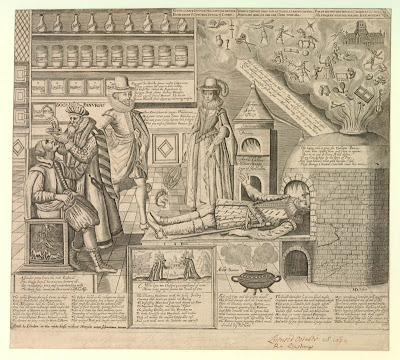During the course of the next few years, we hope that our project will shed light on a whole host of issues and problems related to the role of medicine and medical practitioners in early modern society and culture. Members of the project team share a range of interests. For some, the statistical data relating to a whole panoply of issues will provide fascinating evidence for the nature and diversity of practice across the British Isles. The inclusion of Wales and Ireland, in particular, offers a fascinating opportunity to explore the medical worlds of two nations that have previously been largely ignored by historians of medicine. It also provides the chance to investigate the degree to which interaction occurred across national and geographical boundaries, as well as between the regions and the centre in England.

At the current time, my own area of special interest has focused on the religious and political dimensions of medicine in the early modern period. In particular, I believe that the vast amount of new and detailed information that has already been gathered makes it possible to reassess the on-going debate over the ideological roots of medical change in early modern Britain. The consensus remains, founded largely on the pioneering work of Charles Webster and Harold Cook, that medical innovation in Britain, be it in relation to medical thinking or medical practice, was largely inspired by puritanism. More recently, Margaret Pelling has argued that the nascent medical ‘profession’ was, if anything, largely apolitical, members preferring to avoid office-holding at all levels. On the basis of evidence gleaned from the project, I believe that it is now possible to re-assess some of these claims and to propose a different account of the way in which religion and politics helped to shape medicine and medical change in the sixteenth and seventeenth centuries.

Generally speaking, I have found little evidence to suggest that medical change was the monopoly of any one religious or political body. The situation, of course, is further complicated by the on-going debate over nomenclature (in particular that relating to definitions of such a slippery term as ‘puritanism’, and how it changed over time). Nevertheless, new evidence suggests that those of a distinctly anti-puritan stance were just as likely to promote new ideas in medical thinking, and new attitudes to the organization of medicine, in the key period after 1640. Many Anglican royalists, who opted to study medicine rather than pursue a clerical career in the 1650s, would appear to have been receptive to the chemical medicines and philosophy of iconoclasts such as Paracelsus and van Helmont. After the Restoration, when many returned to the Church, they continued to study and promote such ideas. Renewed focus on the period after 1660, in particular the role of the restored king, Charles II, and leading figures in the church such as archbishop Sheldon, also suggests a great enthusiasm in royalist-Anglican circles for the medicine of van Helmont and a willingness to promote institutional change. The failure of the Society of Chemical Physicians in 1665 to usurp the authority of the London College of Physicians – a body that was seen by some as puritanically inclined after 1660 – did not prefigure an end to official encouragement for change. Charles II’s court was dominated by chemical physicians, and new attempts to overthrow the monopolistic authority of the College of Physicians resurfaced in the 1670s.
While puritanism then does not seem to have acted as the chief catalyst for medical reform in the 17th century, the evidence from the database strongly points to the period from 1640 to 1660 as a key moment in the creation of a new atmosphere in society receptive to medical innovation and speculation. While no one group monopolized such attitudes, the period did witness one further important development. From 1640 onwards, there is a mass of evidence to suggest that the medical ‘profession’ was becoming increasingly politicized, and that this politicization took numerous forms. One of the most interesting concerns office-holding, at both local and national level. Whereas prior to 1640, as Maggie Pelling has shown, physicians rarely took on political office, thereafter they were to do so in considerable numbers, a process that was further accelerated in the years after 1660. By 1700, it was quite common for medics to sit as aldermen in their local corporations, and to assume the office of mayor. Medical men, then, were no more immune from the political events of the period after 1640, and they played their part in such developments in a variety of ways, which I hope to explore in future publications and talks*. At the same time, the politicization of the medical ‘profession’ impacted, in subtle ways, on medicine itself. While, I suggest, it is no longer possible to argue for a straightforward correlation between medical progress on the one hand, and a single religious or political group on the other, there are grounds to suggest that medical thinking was shaped by the wider political and religious currents of the age.
* upcoming: Peter Elmer, ‘Medicine, Religion and the Politics of Healing in Early Modern England’, King’s College, London, Strand campus, Wednesday 6 February 2013, at 6.00pm.
